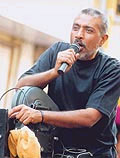Prakash Jha’s tryst with kidnapping industry
Share
Director Prakash Jha, who is ready with yet another hard-hitting film “Apaharan”, says he had to interact with both cops and robbers involved in the kidnapping industry in Bihar for it.
‘Apaharan’, though the subject deals with crime, has a lot of social nuances. It is the story of a tumultuous and complex relationship between a father and a son set against this social backdrop,” Jha told Bollywood Trade in an interview.
In the past too, Jha has made several films like “GangaaJal”, “Mrityudand” and “Damul” that used cinema to bring forth burning social issues, especially in Bihar.
Jha also defended his choice of actors – Ajay Devgan and glamour girl Bipasha Basu. “Ajay is a good actor. He is a good human being. He can understand the parameters of the character very easily,” he said adding that Bipasha suited the role of “an urban, Bihari, educated girl”.
Excerpts from the interview:
After “Gangaajal” why “Apaharan”?
Well, I belong to Champaran where it is said that professional kidnappings began. People being kidnapped just for a bicycle as ransom! I kept looking for a story that would express the deeper sentiments involved. So I went to the prisons and met some people who had been accused of being the kingpins in the kidnapping industry. And, I also spoke to some cops who have been handling such cases.
Didn’t the idea of this film develop at the same time as your first active engagement in the political process started? Were you inspired by this experience?
No. While I was finishing “GangaaJal” I felt it was the right time to work on the subject. I may have picked up a lot of nuances of spoken words. Some shades of characterisations have been influenced by my encounters during electioneering.
My need to join the electoral politics was a completely different experience, with a completely different intention. Those experiences may get directly related to my next film, which is “Rajneeti”.
Do you see “Apaharan” as an extension of your previous work – “Damul”, “Mrityudand”, “GangaaJal”? How would you place “Apaharan” in that context?
I think somewhere right from my childhood, being brought up in a zamindar’s family, I reacted to the situation around me. And at some point it must have led to a lot of questioning. “Damul”, “Mrityudand”, “GangaaJal” are films which are part of the ongoing process of the changing social-political scenarios in Bihar. These films deal with the caste factor, the class factor, the market economy and the way it has brought about various issues and changes.
And “Apaharan”, though the subject deals with crime, has a lot of social nuances. It is the story of a tumultuous and complex relationship between a father and a son set against this social backdrop.
This is your third film with Ajay?
Ajay is a good actor. He is a good human being. He can understand the parameters of the character very easily. He is very spontaneous and instinctive in his expressions. That’s what is so good about him. He will never overdo or under-do a character. He is consistent.
What’s Ajay’s character?
Ajay plays the role of Ajay Shastri who aspires to become a police officer, which is his ticket to power, respectability, enhanced social status and a secure life with his childhood sweetheart Megha. And he hopes it will make his father proud. Ironically, he has a setback due to the choices made by his own father who is a courageous man ruled by conscience and principles.
What’s Nana Patekar’s role and how was it working with him?
Great! It was wonderful working with him. He is another honest person in the sense that there is nothing hidden about Nana. His role is of the self-proclaimed minority political leader – Tabrez Alam. Nana has accomplished this role with lots of conviction. The character is so complex that only Nana could have accomplished this role. Fortunately, Nana liked the script and slowly he got into the character.
Bipasha in “Apaharan”?
She suited the requirement of my role. I feel she has done good work and she is a very competent actress. The kind of look that I needed for an urban, Bihari, educated girl, I found it in her.
Only one song, “Aaoji babu”, in your film?
“Aaoji babu” is not the so-called item number, but is more of a scene underlining Ajay Shastri’s evolution in the new world he has entered. It facilitates the narrative, giving a new dimension to the protagonist’s character. It’s a soft, smooth, melodious, slick and good-looking song.
Background score?
Wayne Sharpe has composed the background score. He is from New Jersey, USA. In fact the process had started three months back when I went to New York to discuss various musical cues for the film. Later Wayne came here prepared with almost 95 percent of the film’s music. After coming here, Wayne added the Indian musical effects and vocals and synced the music with the scenes.
Shooting in real setting in Satara?
The sort of energy I want to pack in my films cannot come from the small, constrained atmosphere of a set because I don’t stay on a particular scene for long. I need to keep moving out, to the streets, houses, office, stations, schools, shops, bazaar.
So it’s only natural and economical for me to look for real locations and remodel them according to my needs, putting up sign-boards, changing the paint here and there, filling the road up with people from the unit – the junior artists.
